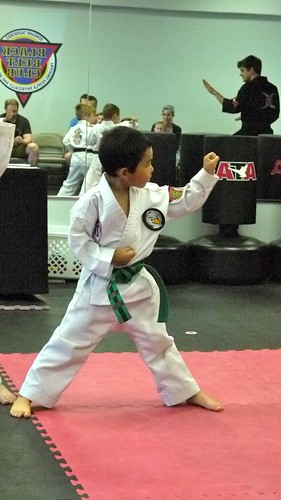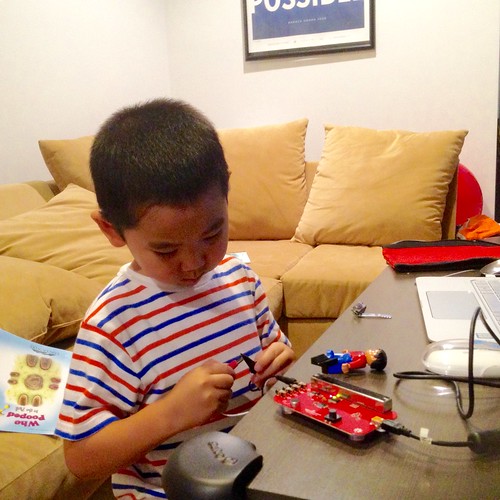And we have survived our first year of Kindergarten! At the beginning of the year we considered this to be the time when as parents are overwhelmingly dominant influence on our child's life is melded with the large amounts of time now spent with school teachers and classmates (not that we are no longer important, but others now play a role). We also find out where he is in comparison with others in all aspects of life.
Things that have changed over the past academic year:
1. His confidence has increased greatly. He had always been uncertain in public, especially when the object of attention. The first area that his confidence grew was in internalizing the curtesies of taekwondo and Catholic school. This became a safe way for him to interact with others. Then, as he grew in confidence that he was competent, and that he could be listened to, he began to be more confident in dealing with others, speaking to people we interact with on a daily basis (like those working at stores, restaurants) or with people he interacts with in activities (like those at the same exhibit as him in museums).
2. His confidence has grown almost too much. He is much willing to interact with others and also to speak his mind and give his opinions (catching up to his peers in this respect). Also, he is less afraid to go off and strike out on his own, which means we need to keep an eye on him to make sure he does not get too far since we cannot rely on his cautiousness to keep him in check anymore.
3. He is much more social. Our shy quiet boy somehow became the one everyone knows at school. Part of it is the notoriety of being the smallest kid in the school (everyone knows who the smallest and who the tallest kids in the school are). And apparently he says hi (or returns 'hi') to pretty much everyone. His other source of notoriety is that he seems to be happy all the time, every day. He is pretty happy by the time we get to school (the wake up sequence is not always so), and after school in the pickup line he is the bouncing bean among the kids waiting for pickup.
4. He is starting to attend to the needs of others. We have been surprised to watch him at play in public settings where he keeps an eye on those smaller than him and tells other kids not to play too rough. I remember watching him at an Easter egg hunt, where after he got his allowed limit he started helping the little kids find eggs.
5. At Taekwondo, he is someone that gives the instructors flexibility when doing paired activities (sparring, self-defense practice, two-person drills). He is good enough to pair with better or most bigger kids (as long as they don't get too wild and run people over, but there are not many of those at his rank), and he does not overwhelm the kids who are less secure in themselves (especially smaller and shy kids. Several of the moms mention that their kids specifically mention liking being paired with T). Not that long ago, he was the smaller and shy kid. When he is in a class of mixed ages, he can be with his own age group (4-6), but if he is the only one, the instructors are comfortable putting him in the next group up (normally, the 4-6 group has simplified combinations and they use 1/2 forms, so putting him in the next group requires more physical coordination and stamina than he is used to).The other nice thing about taekwondo is that his teachers are deliberately harder on him than other kids of his age and experience, meaning they do not let him get away with sloppiness when they know he can do better.
6. Over-confidence pt 2. He takes advantage of the fact that he can read (and most kindergarteners cannot do so effectively). His teachers report that he has taken to reading the instructions for activities instead of waiting for the teachers to read the instructions for everyone. The effect is that he is done with the activity before everyone else has started. This causes problems because it means he is not practicing listening to instructions from the teachers. It also means he gets bored because he has nothing to do when everyone else is doing the activity.
7. Ahead academically. The school he goes to has one member of the staff who does not really believe that kids differentiate early. One time she was visiting a class and she noted that T was going through an exercise very smoothly. His teacher noted that it was easy for him, because "it was only first grade material."
Our major concern for the future. We know a lot of kids who are very bright, their parents report that they find their school exercises very easy, who have lost their ability to handle difficulty or correction. Many research articles suggest that part of the issue is that they have a lot of feedback from school and other settings saying they are good and smart, so they resist hearing it from parents or others who suggest that they are not attaining mastery without effort. On our end, we are trying to nip this early. We make sure he is challenged at least some of the time with reading (if he reads with us, it is material that stretches him), our math activities are selected from a source designed to focus on thinking (by using material they are very unlikely to learn in school). And it is very easy to make sure his piano and taekwondo are pushing him at all times. My way of wording our goal is that we try to make sure he is challenged, but he can still succeed (if he does not give up along the way). For the school, they are instituting a framework for kids to move ahead in reading (individualized reading based on standardized test results), and they are looking at ways to do something similar in math.
Our other major concern is about the areas he is not strong in, how much should we care? He is still adverse to public performance (a major concern of mommy, who is a concert pianist) and he is not always self-assertive (although this may be due to a lack of desires to assert for). He will probably always be among the smallest of his grade, which makes contact team sports problematic. And there is a cultural thing about not being better than peers, which has an implication we should not let him move forward where he is capable of doing so.
 |
| Double forearm block as part of his ATA Taekwondo poomsae |

